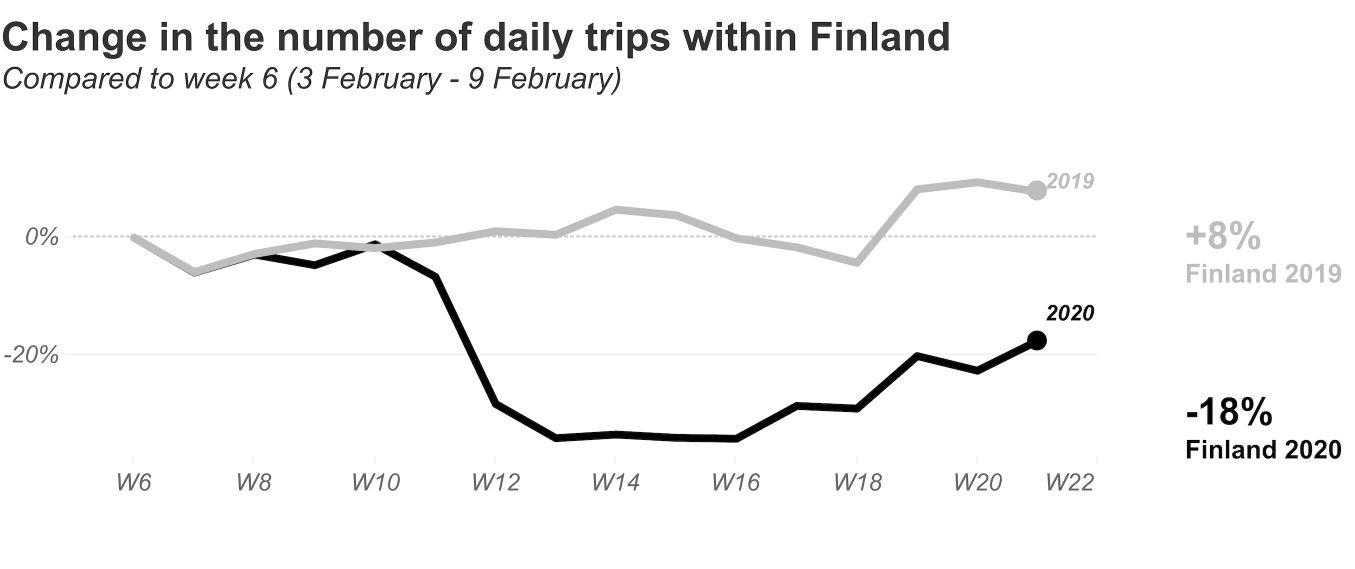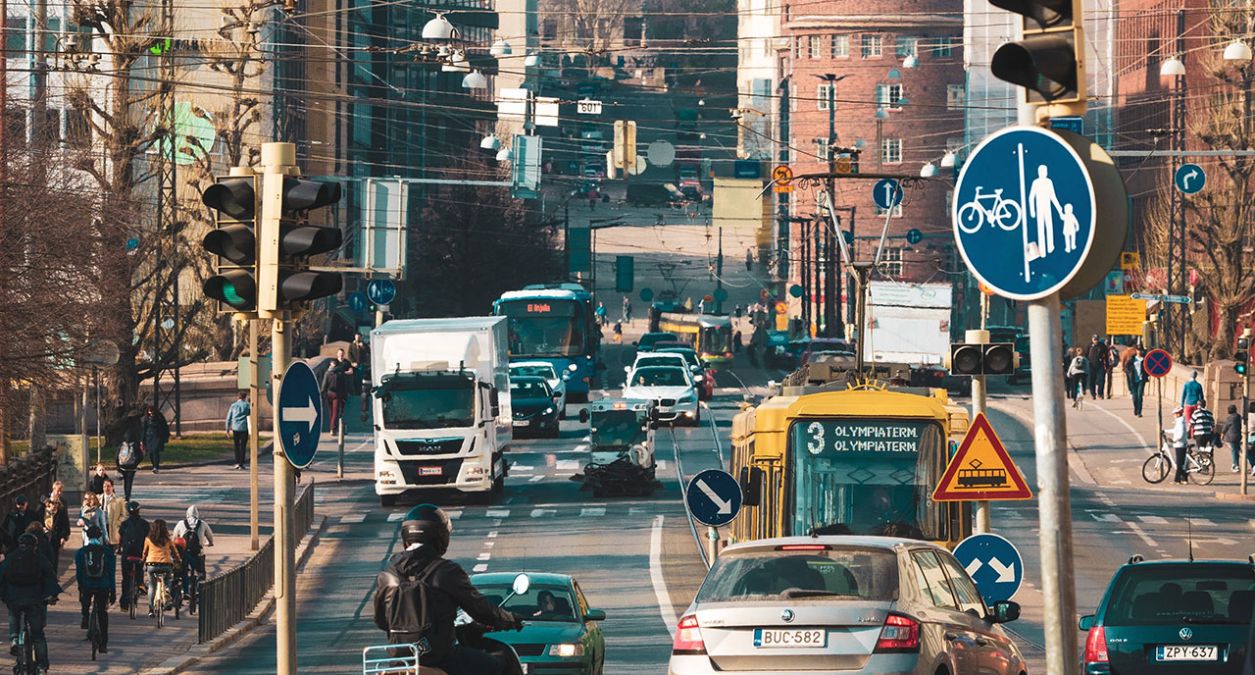Tracking crowd movements can help fight coronavirus – but only if the data can be trusted
A new, more acute need for understanding the movement of crowds has arisen since mid-March, when the coronavirus hit the Nordic countries with force.
In order to prevent the spread of the virus as much as possible, restriction measures were put in place. In order to assess their effectiveness, it is necessary to measure the changes in population movement patterns they cause. This enables the measures to be fine-tuned and helps with future decision making.

In the face of a new, unknown situation, it is important to base decisions on information that reflects the real situation at hand as comprehensively and reliably as possible. All decisions must be made using valid, responsible information. Information that represents the entire population. Information that takes care of privacy.
The significance of knowledge-based management is emphasised in the crisis
After understanding the phenomenon, we will be able to make informed decisions and, with the right data sources, also measure the impact of our decisions. However, technology alone is nothing without valid data. The importance of data and technology is even more pronounced in exceptional circumstances, as it is important to understand both in the big picture and in more detail what the world looks like.
Telia Crowd Insights makes the significance of data concrete, particularly in this crisis. Right now, there is more need for reliable, responsible data than perhaps ever before. With the service introduced in Finland in 2018, we have been able to respond quickly to the information needs of different organisations.
This has been possible because our service has been carefully developed and validated long before its introduction. During the development work, we have discussed the topic with the Office of the Data Protection Ombudsman and the Finnish Transport and Communications Agency. We have been looking to develop privacy and data protection issues carefully, as our customers’ privacy is at the heart of our operations.
Privacy cannot be compromised under any circumstances
It is important for every data-provider that the responsibility of the services is properly managed. A large number of privacy-related studies are being carried out. In Finland, for example, the Chancellor of Justice has investigated and approved the co-operation between Telia and the Prime Minister’s Office in the coronavirus crisis. “The use of the service at the Prime Minister’s Office could not jeopardise anyone’s rights and the Prime Minister’s Office had not acted unlawfully or otherwise erroneously when introducing a service utilising mobile device location data,” the Chancellor of Justice explains his solution (link).
In Denmark, too, authorities carefully studied the legality of the Crowd Insights service before it was introduced. A wide-ranging, necessary and in-depth debate is ongoing on the subject in other parts of Europe, as well. For example in the Netherlands, researchers have opened the debate.
Authorities, the media and the general public have an enormous need for data
Crowd Insights data is collected from mobile network data by an automated process that anonymises, aggregates and extrapolates data to cover the entire population using market share data. The result is statistical-level data on the population – without making it possible to identify individuals or small groups.
The service’s comprehensive, anonymised and aggregated statistical-level data meets the nationwide needs – from the most accurate grid level to the roughest provincial level. The service has full geographical coverage in Finland, Sweden, Norway, Denmark and Estonia. With the existing service, we have been able to help the authorities in all of these countries.
Because of the way in which the coronavirus is transmitted, it is now important to understand the movement of crowds and how they behave. We are able to help with this information need by measuring travel volumes, i.e., how many trips are made, for example, between provinces. Typically, we all make several trips during the day – from home to work, possibly at work we move to lunch, from work to hobbies and, finally, home again.
During the coronavirus crisis, the number of trips has decreased significantly, as many of us have completely skipped trips to both the workplace and hobbies. To understand this change, we help a wide range of operators in the Nordic countries – Emergency unit of Oslo municipality in Norway, Folkhälsomyndigheten in Sweden, Statens Serum Institut in Denmark and, in Finland, the Prime Minister’s Office.
In addition to the above, we also help regional actors, such as municipalities. We offer municipalities our City Vitality Insights service free of charge so that municipalities have a better understanding of the people flows in their municipality.
We have also helped Finnish and Swedish media organisations to understand and inform about changes in the movements of people. As part of this, we provided statistics on people flows during Easter for the City of Helsinki (link).
Our co-operation with universities also provides information that is important to the society. An example of this is the blog post by the University of Helsinki’s Digital Geography Lab link. We are also an active member of the KoronaGIS group, which is a volunteer group of Finnish geographic information data experts, (link). The group organised a series of webinars where we shared experiences on utilising location intelligence in the management of the coronavirus crisis (link). We also provide continuously updated information to the general public on our own website (link).
What happens after the exceptional situation?
Forced by the exceptional situation, we have learned better the need for quality and responsible information. Data has already been an important part of decision-making, but it will be even more so in the future. The use of data will certainly become the so-called new normal, where we will increasingly use continuously updated information in decision-making and develop our operations based on the results measured.
With the exceptional situation, we have also had a more active social debate on privacy and its importance. Even in the world following the coronavirus crisis, it is important to understand that data and technology must be treated responsibly. It is important for everyone that all actors understand their own responsibilities and act accordingly. For services, this leads to even greater investments in privacy. At the same time, the use of various continuous services is also increasing, as they allow us to easily view continuously updated data.
Cookie notification
Cookies allow us to optimize your use of our website. We also use third-parties cookies for advertising and analytics. Please read our Cookie Policy for more information.

